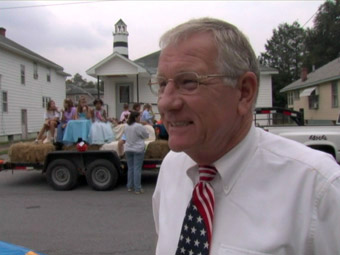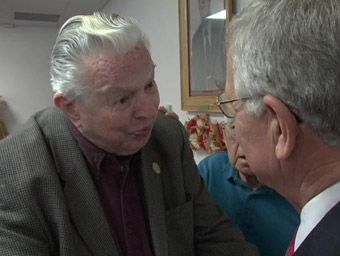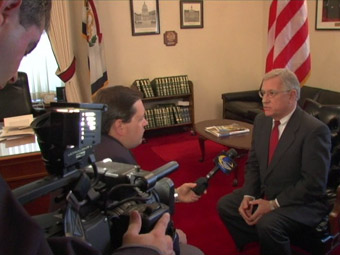|
In 1972 director/cameraman Wayne Ewing made a film titled If Elected... that followed the efforts of a young political hopeful named Warren McGraw during his campaign for a seat in the West Virginia State Senate. It was broadcast in 1973 as part of the series Bill Moyers' Journal, and the critical acclaim with which it was greeted helped launch Ewing's filmmaking career. If you live in the UK there's a good chance you'll never even have heard of the film, let alone seen it. It's not listed on the IMDB and is not part of its Ewing filmography. All of which, from what I've caught of the film, is a damned shame. I've not seen all of it either, you see, only extracts from it, but they represent a very seductive hook. But I digress. Sort of. Twenty-two years, a great many TV documentaries and a credit for creating the distinctive visual style of Homicide: Life on the Street later, Ewing returned to the subject of his first film to once again follow McGraw as he runs for re-election to the West Virginia Supreme Court, a contest that was regarded as the nastiest judicial race of 2004.

I'll say up front that I initially felt disadvantaged by not having seen If Elected. As with Nick Broomfield's Aileen Wuornos films or the Maysles Brothers' Grey Gardens duo, the drama feels just a little incomplete without its first act, despite some nicely integrated extracts. But in the end the re-election campaign is a story in its own right and there is never the sense that knowledge of the first film is assumed, with the included clips used primarily for comparison purposes (the waiting for results, for example, is effectively cross-cut between the two timelines) or to clarify references made to it by the participants, as with the talk radio DJ who all but sneers at McGraw "You haven't changed a bit since that documentary." Probably the most amusing reference to the earlier film occurs when one of McGraw's supporters reveals that he has a bootleg copy of it, only to have McGraw smilingly warn him that the copyright owner might be nearer than he realised.
In many ways The Last Campaign is a Direct Cinema companion piece to Ewing's 2005 Benched: The Corporate Takeover of the Judiciary, a revealing and troubling reportage piece that looked at the huge sums being poured into a Republican political campaign by the US Chamber of Commerce, fuelled by scare story publicity regarding spiralling law suits and an increasing shortage of doctors willing to work in the state. As it turns out, the very same issues are at the heart of the campaign here, with McGraw demonised in downright unpleasant TV ads, the Chamber of Commerce once again throwing money at the Republican campaign, the same claims that doctors are fleeing the state used for scare tactics, and another big corporation that has been stung by a sizeable law suit willing to spend all it takes to get a man sympathetic to their cause into office (although to keep the chronology right, it should be noted that Benched was made after The Last Campaign – I just caught them in reverse order).
It is, it has to be said, a largely one-sided look at a series of events that would benefit from wider examination, which is of course what Ewing set out to do and achieved with Benched the following year. The very nature of Direct Cinema is to pick your subject and stay with them, observing events exclusively from their viewpoint without commentary or interview, the story only really taking shape at the editing stage. McGraw himself has been involved in politics long enough to look and sound just like a politician, although his way with interview and practiced hand-shake is later revealed as his only real weapon against a heavily funded and extremely unpleasant ad campaign, one that openly accuses him of helping to free a sex offender to prey on your kids. It's a thoroughly nasty approach that paints a sorry picture of the level to which political campaigning has sunk in some quarters, but becomes altogether more sinister when seen alongside the virtually identical attack launched against Democratic candidate Gordon Maag in Benched, suggesting that this is becoming the modus operandi of the pro-Republican campaign. The similarities extend to the establishment of a seemingly family-friendly group to back the anti-Democrat cause, in this case the self-righteously named "For the Sake of the Kids," who it turns out are funded by a coal company executive facing a $60 million judgement against his firm that is soon up for appeal before the West Virginia Supreme Court.

Despite seeing things only from McGraw's point of view, which leaves a few questions teasingly unanswered, there is an increasing sense that beneath McGraw's polished political image is an essentially decent man trying to do the right thing, but within a democratic process that appears to be increasingly undermined by the power and influence of big business. When challenged, he argues his case with conviction, and the respect he commands from miners whose cause he supported when they were fighting for workmen's compensation (there's a particularly inspiring and passionate speech made in his support at a United Mine Workers rally) bought him a lot of credibility with me. In the end, it's this footage of McGraw on the campaign trail, meeting, talking to and actually listening to ordinary working people that engages you most with both the man and the politician, involving us in Ewing's favourite story of the fight by an individual against an increasingly and dangerously imbalanced system.
As a stand-alone documentary, The Last Campaign is an involving and ultimately poignant piece, a though-provoking postscript to a political career and evidence that the principals of Direct Cinema are still alive and well. Although playing as a double-bill with If Elected... would make ideal viewing, I would suggest that a more charged pairing would be with Benched, which takes the issues raised here and explores them in considerably more detail and to even more worrying effect.
Shot on what looks like DV-Cam (I'm cheating here – Ewing catches his own reflection briefly in a mirror), the transfer is, as expected with video source material, largely clean, sharp and with good contrast and colour. There is a little digital noise visible, but it is never intrusive. The extracts from If Elected... appear to be 16mm sourced and contrast on these is considerably weaker and the picture, as was the nature of high speed 16mm stock of the time, a little softer.

The stereo soundtrack is well recorded and mixed with some occasionally distinct separation. The If Elected... clips are inevitably less distinct, as are the advertisements, which have clearly been grabbed from a number of sources.
Nothing here.
A fine and example of modern day Direct Cinema that kicks off as a character study but on the way uncovers enough shady political malpractice to warrant further investigation, which is exactly what it got with Ewing's Benched: The Corporate Takeover of the Judiciary, a film I would strongly recommend as a companion piece to this one. As ever with Ewing, the DVD is not regionally coded and can be purchased directly through his web site at www.thelastcampaign.com.
|